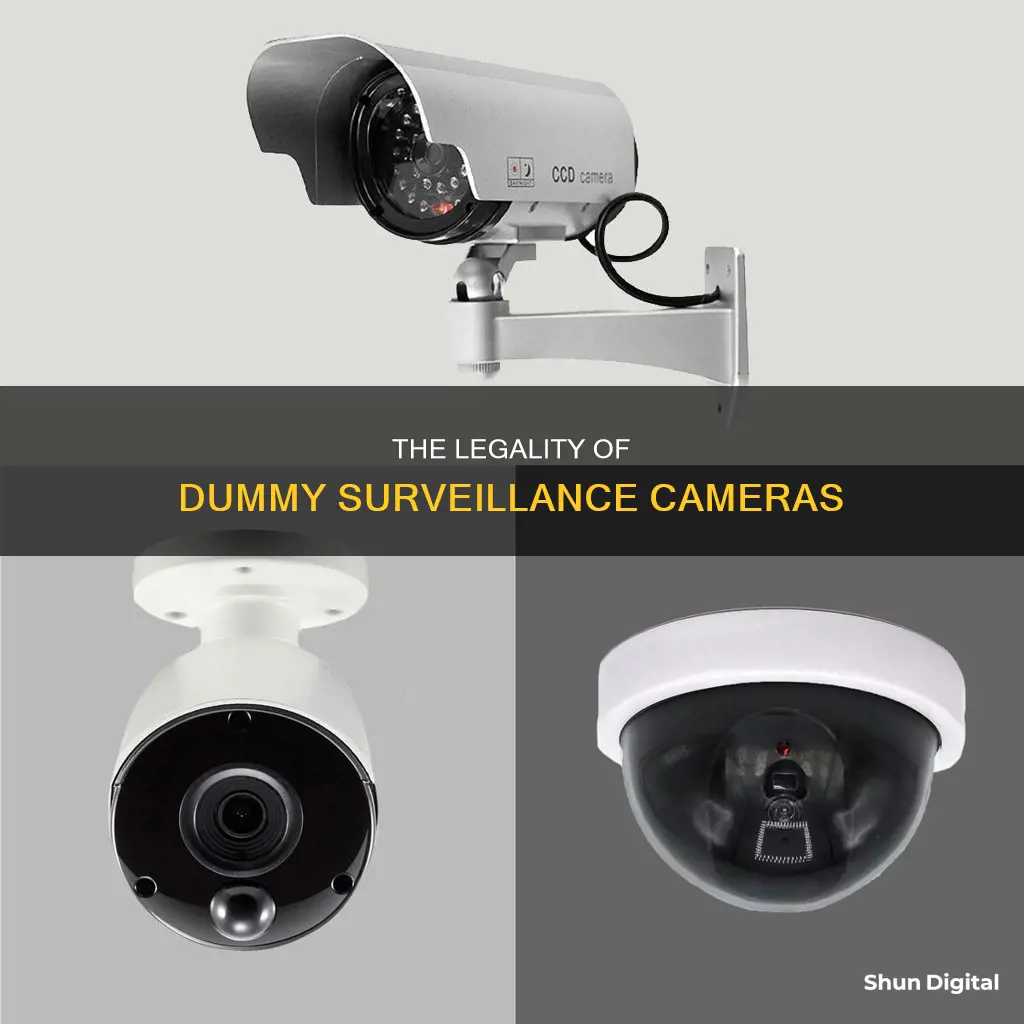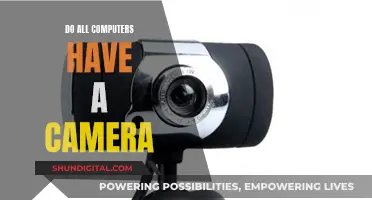
Fake surveillance cameras, also known as dummy cameras, are often chosen as a cheap and easy way to deter crime. While they may be effective in scaring off some thieves, they are unlikely to convince experienced criminals. More importantly, the presence of fake cameras can create a false sense of security for staff, customers, tenants, and visitors, leading to potential liability issues for business and property owners in the event of a crime. In some cases, people have successfully sued organizations for installing fake cameras when criminal actions took place. Therefore, it is essential to understand the legal implications and potential risks associated with using fake surveillance cameras before making a decision.
| Characteristics | Values |
|---|---|
| Legality | Legal problems may arise from the use of fake surveillance cameras. |
| Effectiveness | Fake cameras may deter petty thieves but are unlikely to fool experienced criminals. |
| Liability | If a crime occurs, the presence of fake cameras may lead to a false sense of security and the property owner being held liable. |
| Cost | While initially cheaper, fake cameras may cost more in the long run due to potential liability issues. |
| Signage | Displaying signage for fake cameras may create a false sense of security and cause legal issues. |
What You'll Learn

Dummy cameras may create a false sense of security
In residential properties, security measures are often used as a selling point for prospective or current residents. When security cameras or systems are advertised as an amenity, residents expect a certain level of safety. If a crime occurs, such as a break-in, theft, or assault, residents may expect that the incident was captured on video footage, which can be used to investigate the crime and identify the perpetrator.
However, dummy cameras cannot provide any recorded footage, leaving residents or businesses without evidence to support their claims. This can create a sense of false security, as people may mistakenly believe that their premises are being actively monitored when they are not.
In some cases, property owners or managers have been held liable for assaults or other crimes that occurred on their premises due to the false sense of security created by dummy cameras. If residents or visitors are led to believe that security cameras are functional and actively monitored, property owners may be deemed negligent if a crime occurs.
Additionally, dummy cameras can be easily identified by experienced criminals, who may take advantage of the lack of actual security measures. Therefore, it is essential to consider the potential risks associated with installing dummy cameras and prioritize the implementation of genuine security measures to ensure the safety of residents and businesses.
The Camera's Obsession with Whiteboards: Why the Focus?
You may want to see also

Fake cameras can lead to legal issues
The presence of visible security cameras can give staff, tenants, and visitors a false sense of security. When people spot security cameras, they assume that the footage is being monitored or recorded. For residential properties, security and safety measures are often used as a selling point for prospective or current residents. There is an expectation that the property is reasonably secure, and if a crime occurs, it is argued that proper security measures could have prevented it.
Failure to have working security cameras installed when residents are under the impression that the area is safe can subject property owners and managers to liability. If a crime occurs, victims may sue the property owner or manager for failing to reasonably secure the premises. In some cases, people have successfully sued organizations for installing fake cameras when criminal actions took place.
In addition, by law, signs must be displayed clearly where CCTV is installed. Displaying these signs when dummy cameras are installed creates a false sense of security. Failing to have these signs may also cause legal problems, as it draws attention to the fact that the cameras are not real.
All security or CCTV cameras are subject to strict rules and regulations, and fake security cameras must be installed in law-abiding locations. If a fake camera overlooks private property or is directed towards a window, legal problems may arise.
Syncing Camera Raw: A Step-by-Step Guide
You may want to see also

They are ineffective at deterring seasoned criminals
Dummy security cameras are ineffective at deterring seasoned criminals. While they are often cheap and easy to install, they cannot secure property or protect people. A visible camera may not be enough to deter criminals, and seasoned offenders may be able to detect whether a security camera is legitimate or not, or even go to the lengths of destroying cameras that could incriminate them.
Fake security cameras are also ineffective as they cannot be used to monitor machinery, processes, criminal activity, or car parks. They may seem like a good value solution, but they could end up costing your business a great deal more in the long run.
In the event of a break-in, fake security cameras cannot record footage. Experienced criminals may also be able to spot them as fakes. There is also a potential legal issue with a security camera that makes people feel safe. If they felt safe because they believed dummy security cameras were real, they may have grounds for legal recourse.
For residential properties, security and safety measures are often used as a selling point for prospective or current residents. When residential property owners and managers advertise security cameras or systems as an amenity, there is a certain expectation of safety. Failure to have working security cameras installed on the property when residents are under the impression that there is a reasonable level of safety in the area can subject property owners and managers to liability.
In addition, if employees, tenants, and visitors observe a security camera when entering a property, they may assume a false sense of security that the property is safe. In some cases, a business owner or property manager may be held liable for assaults or other crimes that may occur.
Charging Your Alto Camera: A Quick Guide
You may want to see also

Dummy cameras can't be used to monitor machinery or car parks
Dummy cameras are a poor substitute for real security cameras. They are often cheap and easy to install, but they do not offer any protection or security. Dummy cameras cannot be used to monitor machinery, processes, or car parks. They are purely decorative and serve no purpose other than to appear as real cameras to deter criminals.
The presence of visible security cameras, whether real or fake, can give staff, tenants, and visitors a false sense of security. When people see security cameras, they assume that the business has taken adequate security precautions to prevent crime and that someone is regularly monitoring the cameras or that the footage is being recorded and can be reviewed if a crime occurs.
In reality, dummy cameras are unlikely to deter experienced criminals. Many dummy cameras have a flashing red LED light on the front, which may look convincing to some. However, those familiar with the technology know that genuine CCTV cameras usually do not have visible lights.
If a crime occurs, a dummy camera will not have captured any footage to assist in identifying the perpetrators. In some cases, business owners or property managers have been held liable for assaults or other crimes that took place on their premises because they had installed dummy cameras that provided a false sense of security.
While dummy cameras may seem like a good value solution, they could end up costing your business a lot more in the long run.
Mastering Cellphone Camera Focus: What You Need to Know
You may want to see also

They are subject to the same stringent rules as real cameras
Dummy cameras are often chosen as a cheap and easy way to deter crime. However, they are not without their legal risks. Even fake cameras must comply with the same strict rules and regulations as real cameras.
In the US, it is usually legal to install a residential security camera and record video. However, citizens are guaranteed a reasonable expectation of privacy, which extends to video recording. This means that you cannot record people in private places, such as bathrooms.
If a dummy camera overlooks private property or is directed towards a window, legal problems may arise. For example, in Canada, recording private conversations is illegal without consent or legal authority, such as a warrant.
In addition, displaying signage that indicates CCTV is installed when dummy cameras are in place creates a false sense of security. This can lead to legal issues as staff, customers, and pedestrians may feel safer, believing any criminal activity will be monitored or recorded.
While there is no specific federal law governing the use of security cameras, there are national laws around privacy and consent that must be considered. On a local level, many cities, counties, and states have their own regulations. For instance, the state of Georgia permits video surveillance in both private and public settings as long as the cameras are in plain sight. In contrast, Canada requires a demonstrable need for covert surveillance to record in private places without people's knowledge.
Therefore, it is essential to understand the relevant laws in your jurisdiction before installing any type of surveillance camera, real or fake, to avoid potential legal issues.
History of Kodak Advantix Cameras: When Were They Introduced?
You may want to see also
Frequently asked questions
The use of fake surveillance cameras is legal, but there are some important considerations to keep in mind. While they can deter opportunistic thieves, they may give a false sense of security to staff, customers, and visitors, which can lead to legal issues if a crime occurs.
Yes, there have been cases where organizations have been successfully sued for installing fake cameras when criminal activity took place. If people believe they are being monitored or recorded, and this is not the case, the organization may be held liable.
Fake cameras are often cheap and easy to install, and they can deter crime by creating the impression that someone is watching.
Aside from potential legal issues, fake cameras do not actually protect people or property. In the event of a crime, there will be no recorded footage to assist in identifying perpetrators.
Yes, remote video monitoring services offer a proactive approach to security. Live agents can monitor your property in real time and intervene immediately if they detect any suspicious activity.







